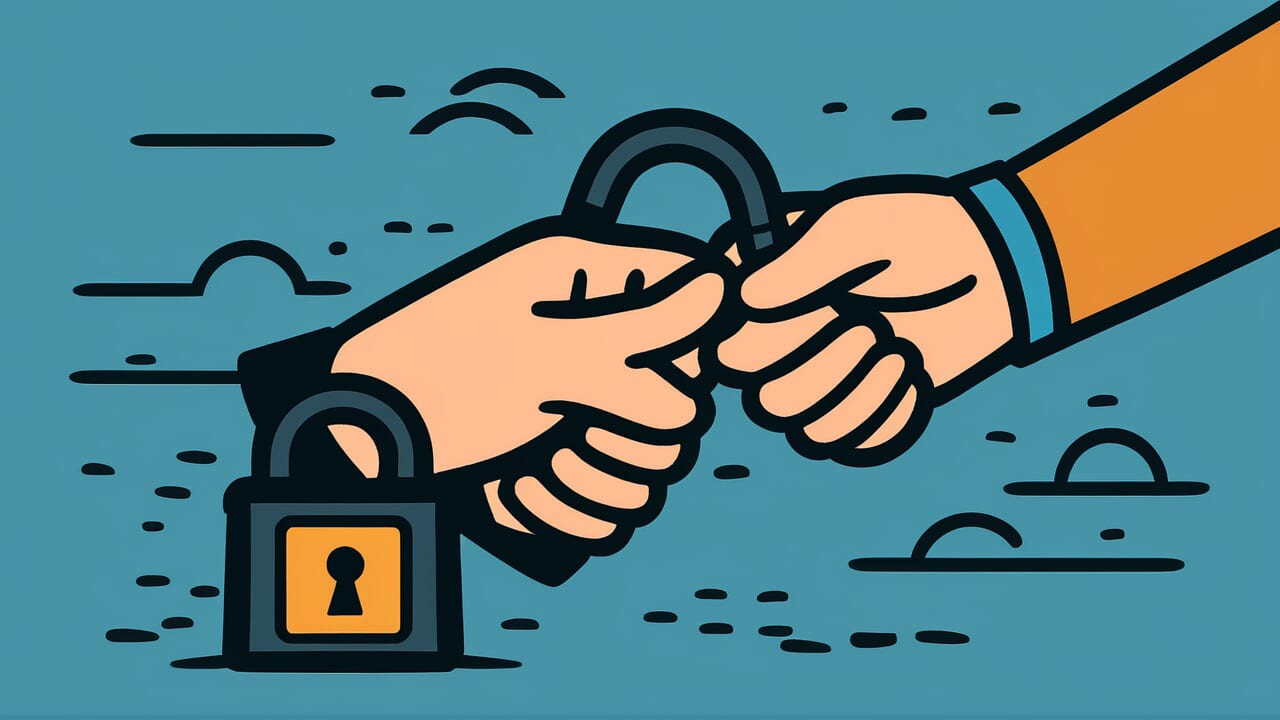How to Read “Wedlock is a padlock”
Wedlock is a padlock
[WED-lock iz uh PAD-lock]
Meaning of “Wedlock is a padlock”
Simply put, this proverb means that marriage can feel like being locked up or trapped.
The saying plays with words that sound similar. “Wedlock” is an old-fashioned word for marriage. A “padlock” is a metal lock that keeps things shut tight. The proverb suggests that getting married is like putting a lock on your freedom. Once you’re married, you can’t do whatever you want anymore.
People use this saying when talking about how marriage changes your life. When you’re single, you can make decisions just for yourself. You can spend money how you want. You can go places without asking anyone. But marriage means thinking about another person first. Some people feel this is like being locked in a cage.
What’s interesting is how this wisdom captures a real tension many people feel. Marriage brings love and companionship, but it also brings responsibility. The proverb doesn’t say marriage is bad. It just points out that commitment always costs something. That cost is your complete independence.
Origin and Etymology
The exact origin of this specific phrase is unknown, though it appears in various forms in English literature from several centuries ago.
The word “wedlock” itself comes from old English and originally meant the pledge or promise of marriage. It wasn’t meant to sound like “lock” at first. But as language changed over time, people noticed how similar the words sounded. This made the comparison to a padlock feel natural and clever.
Sayings about marriage being restrictive have existed for a very long time. In many societies throughout history, marriage meant giving up certain freedoms, especially for women. These types of warnings about marriage became common folk wisdom. The specific “padlock” comparison likely developed as people played with the sound of the word “wedlock” and found humor in the similarity.
Interesting Facts
The word “wedlock” originally came from the Old English “wedlac,” which meant “marriage vow” or “pledge.” The “lock” part didn’t originally refer to being locked up at all.
This proverb uses a literary device called a pun, where words that sound alike create a double meaning. Puns were especially popular in folk sayings because they made wisdom easier to remember.
Usage Examples
- Bartender to regular customer: “He’s been complaining about his wife all night – wedlock is a padlock.”
- Sister to brother: “You seem so restricted since the wedding – wedlock is a padlock.”
Universal Wisdom
This proverb reveals a fundamental tension in human nature between our need for connection and our desire for freedom. Throughout history, people have struggled with this same contradiction. We want to belong to someone, but we also want to remain independent.
The wisdom touches on something deeper about how commitment works in human relationships. Every meaningful bond requires some sacrifice of individual choice. This isn’t just true for marriage. It applies to friendships, family relationships, and even career choices. The more we commit to something or someone, the more we limit our other options. This creates anxiety because humans naturally want both security and freedom.
What makes this tension universal is that it reflects how we’re built as social creatures. We need others to survive and thrive, but cooperation always means compromise. Our ancestors understood that strong relationships require giving up some personal desires for the good of the partnership. They also knew that this sacrifice, while necessary, would never feel completely natural. The proverb captures this eternal human struggle between individual wants and collective needs.
When AI Hears This
People create their own traps on purpose, which seems strange. Marriage works like making a bet with yourself that you cannot take back. You promise something today that your future self must keep forever. This removes the choice to quit when things get hard. It turns love into a binding contract that survives even when feelings change.
Humans do this because they know their own weaknesses too well. They realize they might give up on good things during bad moments. So they build walls around their choices before those weak moments arrive. The “padlock” protects the relationship from their own future doubts. They sacrifice tomorrow’s freedom to save today’s commitment from their own changing minds.
This shows how clever humans really are about their own flaws. Most creatures live only in the present moment without planning ahead. But humans can see their future selves clearly and plan against them. They use restrictions as tools, not punishments. The lock becomes a key to achieving what they truly want most.
Lessons for Today
Understanding this wisdom means recognizing that all meaningful commitments involve trade-offs. The key insight isn’t that marriage is bad, but that every choice to commit deeply means saying no to other possibilities. This awareness can help people make better decisions about relationships.
In personal relationships, this understanding encourages honesty about what commitment really costs. Instead of pretending that love conquers all limitations, partners can discuss what freedoms they’re willing to exchange for security and companionship. This honest conversation often strengthens relationships because both people understand what they’re choosing.
The wisdom also applies beyond marriage to any situation requiring dedication. Career commitments, friendships, and family responsibilities all involve similar trade-offs. Recognizing this pattern helps people choose their commitments more carefully. Rather than feeling trapped by choices they’ve made, they can appreciate what they’ve gained while acknowledging what they’ve given up. The goal isn’t to avoid all commitments, but to make them with full awareness of their true cost.



Comments